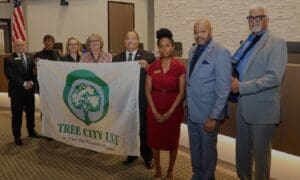Several opponents of the west Fayetteville bypass have alleged that the $29.7 million project is a “developers’ road.”
Some opponents have even charged that the bypass was a county commission gift to land speculators to enable development of large parcels of land along the second phase of the road., which travels through central Fayette County.
The Citizen has embarked upon a detailed study of all the large tracts of undeveloped land along the second phase of the bypass. (See the detailed map of the bypass and adjacent tracts on Page A8.)
The results showed that every undeveloped tract over 50 acres along the bypass route has frontage along an existing county road or state highway, making significant residential development possible even if the bypass second phase were never to be built.
Thus, while the bypass may eventually facilitate more access to new development, the road is not critically needed for such development to take place due to existing roads that are already in place.
Nearly all of those undeveloped tracts are zoned for subdivisions with a two-acre minimum lot size, though several are zoned agricultural residential, which has five-acre minimum lot sizes.
The second phase of the bypass is still in the early pre-construction stages as land acquisition has not yet begun in earnest. Once complete, it will stretch from Sandy Creek and Tillman Roads all the way to Ga. Highway 92 north at Westbridge Road.
Once all three phases of the bypass are complete, motorists traveling up Ga. Highway 85 south will be able to avoid downtown Fayetteville and use Hwy. 92 to take several rural roads into Fulton County to reach Ga. Highway 138 and ultimately, Interstate 85.
Despite criticism from bypass opponents including the West Fayetteville Bypass Coalition, County Commission Chairman Jack Smith insists the project remains necessary even as the economy has practically halted residential growth in surrounding counties, including Fayette.
Smith said the bypass is a way to help control the growth that comes Fayette’s way, as motorists drive through Fayetteville from Spalding and Coweta counties as they travel to Hartsfield Jackson International Airport and beyond for work.
Smith said Fayetteville’s traffic “is pretty significant” judging by what he has observed in the community.
“A great deal of traffic is created outside our boundaries and we must deal with it or be choked by it,” Smith said.
Smith said most residents he speaks with understand the need for the bypass. He pointed out that curb cuts on the two-lane road will be restricted in order to maintain the road’s goal of keeping traffic moving.
The county commission has ordered staff to develop an access management plan to accomplish that goal. That document is expected to be ready sometime in the first quarter of 2010.
“They will design that access plan so we will not have multiple intersections on this road that would create traffic impediments — which is the very thing we are trying to get rid of to move people through the county,” Smith said.
Meanwhile, with the latest Special Purpose Local Option Sales Tax defeated, elected officials in Peachtree City have been calling for the county to cancel the bypass and funnel the funds to Fayette’s cities to make up for the lack of revenue that will begin the end of March when the current transportation SPLOST ceases to be collected.
Smith said the county cannot divert funds to the cities because it is bound by law to address only those projects that are on the SPLOST referendum. The county is bound to follow the voters’ wishes, he added.
“If we don’t complete the projects then the money can’t be divvied up among governments and spent for something else,” Smith said. “The voters said, ‘You are only going to spend money for this purpose.’”
Smith added that the SPLOST funds cannot be spent for general government services other than allowed by the SPLOST language.
“So if the SPLOST said this must be used for roads, you can’t hire public works people with it,” Smith said.
The SPLOST resolution approved by the previous county commission in 2003 includes a list of projects for specific roads in Peachtree City, Fayetteville, Tyrone and the county. The only more general reference to a few road projects to give any flexibility were contained in the county’s 2003 Comprehensive Transportation Plan, in which the west Fayetteville bypass was listed as a project.
A bid to replace the expiring transportation SPLOST with another which focused on debt repayment with some transportation projects failed miserably at the polls in November.
Smith, in a wide-ranging interview about the bypass last month, also answered another criticism of the West Fayetteville Bypass Coalition, that the county is “not caring about the environment” by proceeding with its bypass plans without preparing an environmental impact statement.
Smith counters that the environmental documents can’t be prepared “until you set the actual route of the road.”
“We are exactly where our advisors and experts tell us we are supposed to be,” Smith said. “And it’s easy to understand that you can’t determine the environmental impact if you don’t know where it’s going.”
Critics have also alleged the bypass is a “road to nowhere” because it doesn’t bring motorists very close to the Interstate. Smith was asked the status of any improvements to Ga. Highway 92 to allow access to I-85.
Smith replied that the Federal Highway Administration, which controls access to interstate highways, is the agency that will make such a decision. The FHA previously has denied proposals to create a full “diamond” exchange at Hwy. 92 and I-85 and also a trimmed down concept of allowing just one northbound access ramp and one southbound “on-ramp” to primarily serve commuters, Smith said.
Currently there is talk of creating an access road stretching from Ga. Highway 74 to Hwy. 92, with Hwy. 74 losing its direct I-85 access. Instead, vehicles on Hwy. 74 would be routed down the access road parallel to the Interstate before accessing an Interstate ramp at an improved Hwy. 92 interchange.
“That’s the current thinking simply because there is nothing else we can get approval or even discussion with the Federal Transportation Administration,” Smith said.
The goal for the bypass has been to impact as few property owners and homeowners as possible while keeping in mind environmental issues and making sure “it does not cost an exorbitant amount of money to construct,” Smith said.
Smith noted that the commission initially intended for the bypass to have enough right-of-way to allow it to be widened to four lanes in the future. But after the county’s transportation consultant said there was more bang for the buck in expanding turn lanes at intersections, it made more sense to ditch the future four-laning of the bypass, Smith said.
Meanwhile, the first phase of the bypass, stretching from Ga. Highway 54 and Huiet Road to Sandy Creek and Tillman roads, is an estimated three months behind its completion date due to the tremendous amount of rain the county has received.
“If it rains today, you can’t do anything today and also the next three to five days because the ground has to dry out before you can compact, pave, gravel, or do anything. If the ground isn’t dry enough you just have to wait for it to be dry,” Smith said.
The road is being paid for using part of a 1-cent special purpose local option sales tax approved in a 2004 referendum put forward by a county commission that included only one current commissioner — Herb Frady.
The other three commissioners who approved the bypass plan subsequently lost reelection bids, even though all of them were generally considered to favor “slow growth” and strict conformance to current land use policies.
Other than Frady, none of the other four currently serving commissioners was in office when the bypass plan was proposed and approved for inclusion in the successful 2004 SPLOST.











Leave a Comment
You must be logged in to post a comment.